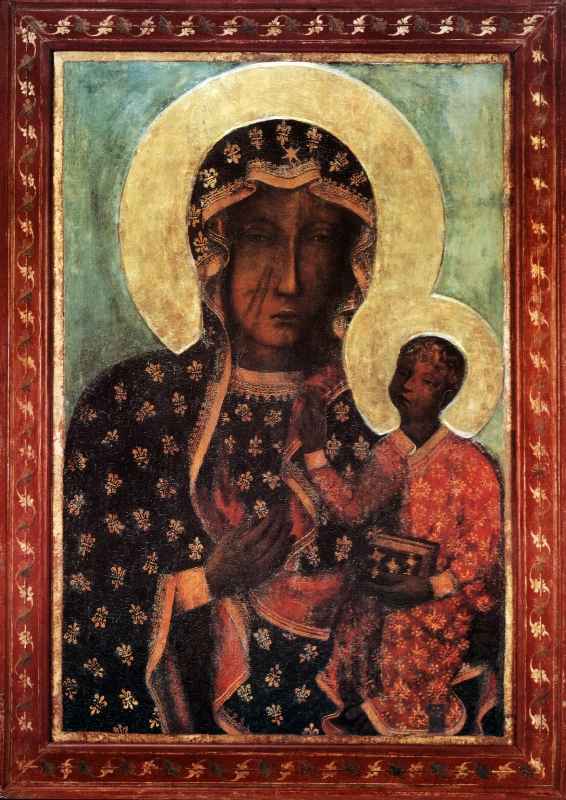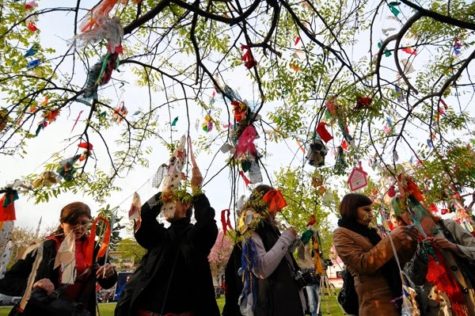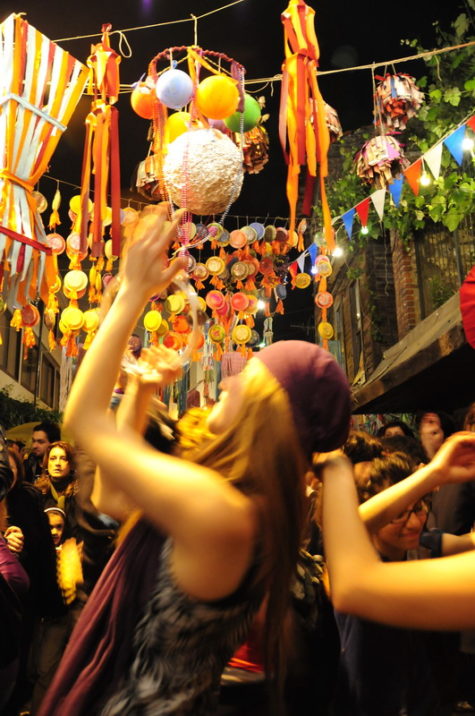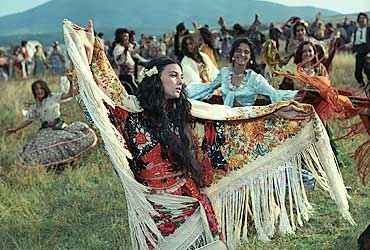May
Avoiding Bad Luck At Home
The Mothers of Arles
The Mothers of Arles is a French festival that runs from May 24 through May 28. This unique festival celebrating the triple goddess is still alive and well in France, celebrated mostly by gypsies. The “Three Maries of the Sea” recall the ancient goddess of life, death, and beauty. The gypsies gather from all over Europe and carry on their annual celebrations of the triple goddess. Three women dressed up as Mare, Tavobe, and Mary impersonate the goddesses, reaching the shore in boats.
In modern times, Sarah and Salome are the companions of Mary in this trinity. Fancy processions, gypsy weddings, trading of all sorts, fortune-telling, the leaping of cows (a survival from the ancient practice of bull leaping), dancing gypsy style, and candles give these days and nights their wild beauty.
From: The Grandmother of Time
Also found in: The Pagan Calendar
Festival of the Holy Marys
St Sara of Egypt is the Romanies’ patron saint. Throughout the eve of May 24 and during May 25th, Gypsies exalt the elements of fire and water. From wood the men have gathered, Gypsy women build a healthy campfire. They cook a huge feast and gather around the fire to exchange presents and good cheer.
On May 24th many Romanies still make a pilgrimage to attend an annual service at the shrine of St Sara of Egypt, in the crypt of the church of Les Saintes Maries de la Mer in the Ile de la Camargue, Bouches-du-Rhone, France. They carry the statue of St. Sara, who is black, into the sea (from where she originated) and out again.
From: The Good Spell Book
Also found in: The Pagan Calendar
Hidrellez
Hidrellez (celebrated on May 6th) is a very significant day, not only for gypsies. It’s been very significant in Anatolia for centuries. The word itself is the combination of names of two prophets: Hizir and Ilyas. Hidrellez signifies a rebirth of nature and is also considered to be the beginning of summer. It is said that whatever you wish for that night comes true!
According to Anatolian people’s beliefs, Hizir and Ilyas are two prophets who drank from the fountain of youth; they are brothers and friends. They have given each other promise to meet on this night of May 5 every year to give rebirth to nature. Hizir is the protector of plants; he gives life to plants. He helps poor people. Wherever he goes, he brings abundance. Ilyas is the protector of waters and according to some, the protector of animals. Wherever he goes, animals become healthier.
People believe that wishes made on this night will come true. They also believe that sick people will become healthier and it will be the end of bad luck and misfortunes. There are also a lot of rituals that people perform.
Some people put a coin inside a red cloth and then hang it on a rose branch. In the morning this money is put into the wallet so that it will bring abundance. It is also believed that if you go out, have a picnic and be in nature on this day, your days in winter will have less hardship. Most city people know this day simply as a picnic day.
Although it is commonly celebrated everywhere in Turkey, its mood is more festive among the Roma community. Apart from Edirne, Istanbul also hosts a major celebration by the Romanis in the historic Ahırkapı district, which was marked with a parade of community members in extravagant and colorful costumes.
Source: Hurriyet Daily News
Also found in: The Pagan Calendar
Đurđevdan
Đurđevdan is a major holiday for Roma from former Yugoslavia, whether Orthodox or Muslim. The various Balkan spellings (Herdeljez, Erdelezi) are variants of the Turkish Hıdırellez.
Ederlezi is the Gypsy name for the Bulgarian and Serbian Feast of Saint George. It’s celebrated on the 6th May, a holiday signaling the beginning of spring, occurring approximately 40 days after the spring equinox. This Spring festival is especially celebrated by Roma people around the former Yugoslavia (and elsewhere around the world), regardless of religious affiliation.
This holiday celebrates the return of springtime and is considered most important. The traditions of the Roma Durđevdan are based on decorating the home with flowers and blooming twigs as a welcoming to spring. It also includes taking baths added with flowers and washing hands with water from church wells. Also the walls of the home could be washed with the water. On the day of the feast it is most common to grill a lamb for the feast dinner. The appearance of music is also very important during this holiday. Aside from dancing and singing, traditional Brass bands are popular.
Đurđevdan in Serbian, Gergyovden in Bulgarian or Jurjevo in Croatian and Bosnian, “George’s day”, is a South-Slavic religious holiday, celebrated on April 23 by the Julian calendar (May 6 by Gregorian calendar). The feast of Saint George is attached to the tradition of celebrating the beginning of spring, and is a very important Orthodox Christian custom of honoring a family patron saint.
Saint George is one of the most important Christian saints in Orthodox churches. Christian tradition holds that St. George was a martyr who died for his faith. On icons, he is usually depicted as a man riding a horse and killing a dragon. Jurjevo is mainly celebrated in the rural areas of Croatia, mostly Turopolje and Gornja Stubica whereas every Đurđevdan is celebrated in many Serbian communities, but mainly in Serbia, Montenegro and Bosnia Herzegovina. In Croatian St. George is called Sv. Juraj while in Serbian he’s called Sveti Đorđe and in Bulgarian- Sveti Georgi.
In Croatia, the Catholic version of St.George’s day, Jurjevo is celebrated on April 23 by the Gregorian calendar. The tradition is mostly celebrated in northern Croatia, in Zagreb County. According to tradition this day marks the beginning of spring. The use of bonfires is similar to Walpurgis Night. In Turopolje, Jurjevo involves a slavic tradition where five most beautiful girls are picked to play as Dodola goddesses dressed in leaves and sing for the village every day till the end of the holiday.
See also: Ederlezi
Source: Wikipedia
Also found in: The Pagan Calendar
Ederlezi
Ederlezi is a popular traditional folk song of the Romani minority in the Balkans (former Yugoslavia). Goran Bregovic’s version was used for the movie, Time of the Gypsies, actually made the song famous.
The song got its name after Ederlezi (otherwise known as Đurđevdan (Ђурђевдан) in Serbian, sometimes transcribed as Djurdjevdan).
Ederlezi is the Gypsy name for the Bulgarian and Serbian Feast of Saint George. It’s celebrated on the 6th May, a holiday signaling the beginning of spring, occurring approximately 40 days after the spring equinox. This Spring festival is especially celebrated by Roma people around the former Yugoslavia (and elsewhere around the world), regardless of religious affiliation.
I love this version, it’s sung by Preslava Peicheva – finalist in Music Idol Bulgaria.
Lyrics in Romani:
Sa me amala oro khelena
Oro khelena, dive kerena
Sa o Roma daje
Sa o Roma babo babo
Sa o Roma o daje
Sa o Roma babo babo
Ederlezi, Ederlezi
Sa o Roma daje
Sa o Roma babo, e bakren chinen
A me, chorro, dural beshava
Romano dive, amaro dive
Amaro dive, Ederlezi
E devado babo, amenge bakro
Sa o Roma babo, e bakren chinen
Sa o Roma babo babo
Sa o Roma o daje
Sa o Roma babo babo
Ederlezi, Ederlezi
Sa o Roma daje
English Translation:
All my friends are dancing the oro
Dancing the oro, celebrating the day
All the Roma, mommy
All the Roma, dad, dad
All the Roma, oh mommy
All the Roma, dad, dad
Ederlezi, Ederlezi
All the Roma, mommy
All the Roma, dad, slaughter lambs
But me, poor, I am sitting apart
A Romany day, our day
Our day, Ederlezi
They give, Dad, a lamb for us
All the Roma, dad, slaughter lambs
All the Roma, dad, dad
All the Roma, oh mommy
All the Roma, dad, dad
Ederlezi, Ederlezi
All the Roma, mommy
The former Yugoslav rock band Bijelo Dugme released a cover version of this song in Serbo-Croatian using the same melody, but with very different lyrics. Under the title “Đurđevdan je a ja nisam s onom koju volim” which is featured on their album Ćiribiribela from 1988.
Bijelo Dugme’s Lyrics:
Proljeće na moje rame slijeće
Đurđevak zeleni
Đurđevak zeleni
Svima osim meni
Drugovi odoše a ja osta
Nema zvijezde danice
Nema zvijezde danice
Moje saputnice
Ej kome sada moja draga
Na đurđevak miriše
Na đurđevak miriše
Meni nikad više
Evo zore evo zore
Bogu da se pomolim
Evo zore evo zore
Ej đurđevdan je
A ja nisam s onom koju volim
Njeno ime neka se spominje
Svakog drugog dana
Svakog drugog dana
Osim đurđevdana
English Translation:
Spring is landing on my shoulder
Lily of the valley is sprouting
Lily of the valley is sprouting
For everyone, except for me
The friends are gone, but I’ve stayed
There is no Morning Star
There is no Morning Star
My fellow-traveler
Hey, to whom does my darling now
Smells of the lily of the valley
Smells of the lily of the valley
To me never again
Here comes the sunrise,
here comes the sunrise
So I can pray to God
Here comes the sunrise,
here comes the sunrise
Hey it’s St George’s day
And I am not with the one I love
Let her name be mentioned
On every other day
On every other day
Except on St George’s day.
And here is a version with Greek lyrics, titled “Tou Ai Giorgi” (“Saint George’s”, Greek: “Του Αη Γιώργη”), was also recorded by Bregović together with Greek singer Alkistis Protopsalti in 1991. The Greek lyrics are credited to Lina Nikolakopoulou.
Lyrics in Greek:
Απ’ τους ώμους να, η Άνοιξη περνά,
γύρω φτερουγίζει,
ξεχνάει εμένα.
Μέρα της χαράς ποια ζωή φοράς;
Δρόμο δρόμο παίρνεις
χωρίς εμένα.
Του ουρανού πουλιά πάρτε με αγκαλιά
το βουνό γεμίζει κεριά αναμμένα
Nα κι η Πούλια ξημερώνει το Θεό παρακαλώ
μα το φως που δυναμώνει
δε μου φέρνει
δε μου φέρνει
‘κείνον που αγαπώ.
Το όνομα του ανθός, ευωδιάς βυθός,
πείτε στα κορίτσια να μην το λένε
μέρα σαν κι αυτή στ’ Άη Γιωργιού τ’ αφτί,
που όλα τα τραγούδια για αγάπη κλαίνε.
English Translation:
Look over the shoulders, spring passes,
flutters all around,
it forgets me
Day of joy, which life do you carry?
Υou take the road
without me.
Birds of sky, take me in your embrace
the mountain fills with lit candles
There it is the morning star, it’s breaking, I beg God
but the light which becomes stronger
it doesn’t bring me
it doesn’t bring me
the man that I love.
His name (is) flower, depth of perfume
tell to the girls not to say that
On the day like this one, at Saint George’s ear
where all the songs weep for love.
Source: Wikipedia
Avoiding Bad Luck
Bad luck at home can be avoided by never washing blankets during the waxing May moon. According to the saying:
If you wash blankets in May,
You will wash a loved one away.
From: The Good Spell Book









